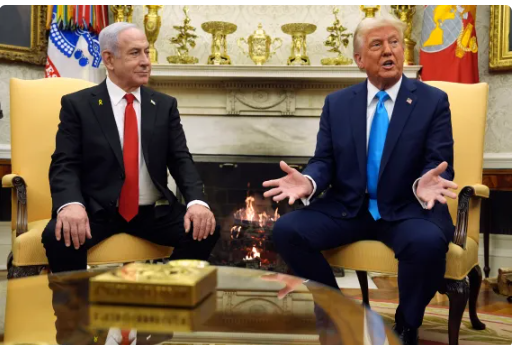
In a dramatic announcement during Israeli Prime Minister Benjamin Netanyahu’s visit to the United States, former President Donald Trump outlined his vision for the U.S.’s involvement in Gaza, signaling a shift in American foreign policy toward the ongoing Israeli-Palestinian conflict. The remarks, made during a high-profile meeting at the White House, have raised eyebrows and sparked intense debate among diplomats, lawmakers, and international observers.
Trump, who has long been a vocal supporter of Israel, shared his plans for addressing the situation in Gaza, an area that has been at the center of intense conflict between Israel and Hamas, the militant Palestinian group. During the visit, Trump stressed that the U.S. would work more closely with Israel to target Hamas’ leadership and military infrastructure in Gaza, while ensuring humanitarian efforts would be prioritized for Palestinian civilians caught in the crossfire.
We will not stand by as Hamas continues to use Gaza as a launching pad for terror attacks against Israel, Trump declared. We aim to help our Israeli allies in securing the region while also ensuring that the people of Gaza are not left to suffer at the hands of extremists.
The announcement represents a shift from the traditional diplomatic stance of the U.S. towards Gaza. Under the previous administration, there was a strong emphasis on counterterrorism and support for Israel’s right to defend itself. However, Trump’s comments go a step further, indicating a more active U.S. role in Gaza’s future, with potential implications for U.S. relations with other Arab nations and the international community.
One of the key elements of Trump’s proposal was a renewed focus on the military capabilities of Hamas and the need to cut off their funding. The former president hinted at increased American intelligence-sharing with Israel, along with possible airstrikes aimed at weakening Hamas’ infrastructure. Trump also discussed the possibility of introducing stricter sanctions on entities that aid Hamas, including those in Iran, which has long been a key supporter of the group.
The former president’s rhetoric drew mixed reactions from the political spectrum. His supporters viewed the remarks as a bold statement in favor of Israel’s security, reaffirming U.S. support for its ally. This is the kind of leadership Israel needs strong, unwavering, and focused on defeating terrorism, said one senior Republican lawmaker.
However, critics raised concerns about the potential consequences of such an approach. Human rights organizations quickly voiced alarm at the prospect of further escalating military action in Gaza, fearing that it could lead to increased civilian casualties and exacerbate the humanitarian crisis in the region. We must be cautious when taking steps that could deepen the suffering of innocent civilians, said Sarah Jenkins, a spokesperson for Human Rights Watch. While we support Israel’s right to defend itself, the solution must include efforts to address the humanitarian needs of the Palestinian people.
The visit also highlighted the growing political dynamics within the U.S. regarding the Middle East. With Netanyahu’s government facing pressure domestically over issues related to the Palestinian territories, his meeting with Trump was seen as an opportunity to solidify a closer relationship with the U.S. Moving forward, Netanyahu may seek stronger American backing for Israel’s security operations in Gaza, while balancing the delicate diplomatic relations with Arab nations in the region.
On the other hand, Trump’s announcement could complicate U.S. relations with some of its Arab allies, particularly those in the Gulf states, who have shown increasing openness to normalizing ties with Israel in recent years. These countries, including Saudi Arabia and the United Arab Emirates, have expressed a desire for a peaceful resolution to the Israeli-Palestinian conflict, which could be undermined by further military escalation in Gaza.
The U.S.’s shifting role in Gaza is not only a key issue for the Trump campaign but also for broader U.S. foreign policy as it relates to the Middle East. The announcement has already sparked discussions in Washington about the direction the U.S. should take when it comes to its involvement in the Israeli-Palestinian conflict. Some have called for renewed diplomatic efforts, while others argue that a more forceful stance is needed to confront groups like Hamas.
As the political and diplomatic fallout continues to unfold, the international community will be watching closely to see how U.S. policy on Gaza evolves under the shadow of Trump’s bold claims. The outcome of this visit may shape the future of American influence in the region and the broader peace efforts in the Middle East for years to come.

